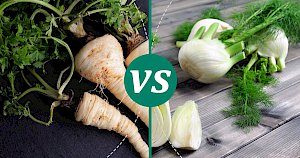Fennel vs Parsnips: Nutrition & Calories Compare


Fennel vs Parsnips
Nutrition Facts
Serving size:
change
5g10g15g20g30g40g50g60g80g100g120g140g160g180g200g220g250g300g350g400g450g500g600g700g800g900g1000g
1oz2oz3oz4oz5oz6oz7oz8oz10oz12oz15oz20oz25oz30oz35oz40oz50oz
Amount Per Serving:
Serving size:
change
5g10g15g20g30g40g50g60g80g100g120g140g160g180g200g220g250g300g350g400g450g500g600g700g800g900g1000g
1oz2oz3oz4oz5oz6oz7oz8oz10oz12oz15oz20oz25oz30oz35oz40oz50oz
Amount Per Serving:
Fennel vs Parsnips 100g Compare
| per 100g | Fennel | Parsnips |
|---|---|---|
| Calories | 31 | 75 |
| Carbohydrates | 7.29 g | 17.99 g |
| Fat | 0.2 g | 0.3 g |
| Dietary fiber | 3.1 g | 4.9 g |
| Protein | 1.24 g | 1.2 g |
| Calcium | 49 mg | 36 mg |
| Iron | 0.73 mg | 0.59 mg |
| Magnessium | 17 mg | 29 mg |
| Phosphorus | 50 mg | 71 mg |
| Potassium | 414 mg | 375 mg |
| Sodium | 52 mg | 10 mg |
| Zink | 0.2 mg | 0.59 mg |
| Vitaminium B1 (Thiamine) | 0.01 mg | 0.09 mg |
| Vitaminium B2 (riboflavin) | 0.032 mg | 0.05 mg |
| Vitaminium B3 (Niacin) | 0.64 mg | 0.7 mg |
| Vitaminium B5 | 0.232 mg | 0.6 mg |
| Vitaminium B6 | 0.047 mg | 0.9 mg |
| Vitaminium B9 (Folic acid) | 27 mg | 67 mg |
| Vitaminium C | 12 mg | 17 mg |
A Tale of Two Vegetables: Fennel and Parsnips
When it comes to the vegetable kingdom, diversity is not just the spice of life—it's a fundamental principle. Among the vast array of veggies, fennel and parsnips stand out not only for their unique flavors but also for their nutritional profiles and culinary versatility. Fennel, with its crisp texture and a licorice-like taste, contrasts sharply with the sweet, earthy flavor of parsnips. But there's more to these vegetables than meets the palate. Let's delve into the interesting world of fennel and parsnips, comparing their nutritional benefits, calorie content, and much more.
Unveiling the Nutritional Landscape
Fennel and parsnips offer a range of health benefits, courtesy of their nutritional compositions. With **31 calories per 100 grams**, fennel is a low-calorie option perfect for weight management. In contrast, parsnips, with **75 calories per 100 grams**, are slightly richer in energy but still a healthy choice. When it comes to carbohydrates, parsnips contain **17.99 grams**, making them a higher-carb option compared to fennel's **7.29 grams**. However, this is balanced by their impressive fiber content, with parsnips offering **4.9 grams** of fiber versus fennel's **3.1 grams**, aiding in digestion and satiety.
Despite their low fat content, both vegetables pack a nutritional punch. Fennel and parsnips contain negligible amounts of saturated fats, making them heart-healthy options. On the protein front, they are fairly matched, with fennel providing **1.24 grams** and parsnips **1.2 grams** of protein, essential for muscle repair and growth.
Minerals and Vitamins: The Unsung Heroes
The real stars of the fennel and parsnip show are the vitamins and minerals they contain. Fennel is an excellent source of vitamin A, offering **134 IU** per 100 grams, vital for eye health and immune function. Parsnips, though not a source of vitamin A, are rich in vitamins B, including B6 and B9, which are crucial for nerve function and fetal development, respectively.
When it comes to minerals, both vegetables have their strengths. Fennel boasts a higher potassium content (**414 mg**), essential for blood pressure regulation, whereas parsnips offer more magnesium (**29 mg**), important for bone health and energy production. Both are low in sodium, with fennel containing **52 mg** and parsnips only **10 mg**, making them great choices for a heart-healthy diet.
Comparing Culinary Uses
Aside from their nutritional benefits, fennel and parsnips shine in the kitchen. Fennel's crunchy texture and unique flavor make it a great addition to salads and slaws, while its fronds can be used as an herb to season dishes. Parsnips, on the other hand, are incredibly versatile, tasting delicious when roasted, mashed, or used in soups and stews, adding a sweet depth of flavor.
Conclusion: A Place for Both on Your Plate
While fennel and parsnips may differ in flavor, texture, and some nutritional aspects, both vegetables are excellent additions to a healthy, balanced diet. Whether you're counting calories, looking to boost your fiber intake, or simply seeking to add variety to your meals, fennel and parsnips offer unique tastes and health benefits that can complement any dish. So, why choose between them? Enjoy both and reap the diverse nutritional rewards they bring to your table.
Fennel 100g
31kcalCalories source
- 81% CARBS.
- 14% PROTEIN
- 5% FAT
Parsnips 100g
75kcalCalories source
- 91% CARBS
- 6% PROTEIN
- 3% FAT
Compares of fennel
- Fennel vs Bok Choy
- Fennel vs Carrot
- Fennel vs Cauliflower
- Fennel vs Cucumber
- Fennel vs Kale
- Fennel vs Kohlrabi
- see all compares of fennel
Marcin Piotrowicz
calories-info.com creator
Healthy diet and healthy lifestyle promoter
Add comment